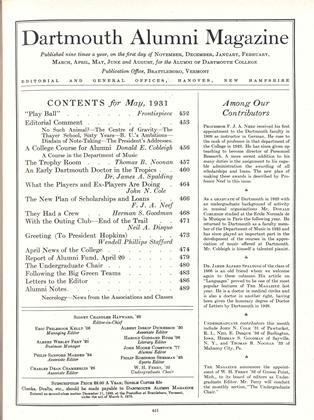Mr. and Mrs. Jack Hurd are going to Germany for the summer. They sail June 14 on the Bremen.
Pat Tobin has come to Gotham to work for the Halm department store chain in the central office. He and your scribe had a pleasant evening recently, talking over his travels here and abroad during the past few years. He recently gave up an interest in a Chicago shoe store for the New York job.
The following is from the New York Times of March 23:
"The wish of the poetical Sumner D. Kilmarx, who since February 17 had been juror 10 in the trial of a suit whose tedium he celebrated in verse, was realized last night when a jury, after deliberating six hours and twenty minutes on testimony that filled 3,000 pages of records in Federal Court, brought in a verdict, and the case, as far as Kilmarx was concerned, was ended.
"When Kilmarx left the jury box to return to his home for a good night's sleep, free from dreams of skeins, cones, spools, and 300 exhibits of artificial silk which were introduced in evidence in the course of the trial, he had the satisfaction of knowing that he would not have to serve on a jury for a long time.
"Judge Henry W. Goddard, a character in Kilmarx's poem, which the author named last night 'The Juror's Lament,' was so touched by the sentiment expressed that he excused the poet and his fellow jurors from serving in United States Court for the next four years.
"Kilmarx is an interior decorator of 668 Fifth Ave. He wrote his 'lament' when the trial was in its third week. Scores of witnesses had been introduced by E. F. Davis, attorney for A. J. Pfeiffer, Inc., plaintiff in a suit for $500,000 against the Duplan Silk Corporation, alleging Breach of warranty.
"Kilmarx stood all this as long as he could. Finally the Muse came to his rescue in the jury box. This is what he wrote: Three weeks ago a summons came For jurors to report To His Honor Justice Goddard Of the Federal District Court.
"With open minds and conscience clear We gladly took our place, To settle on its merits A complicated case.
"The Pfeiffer Corporation, Who deal in hosiery cones, Were suing Duplan Company For five hundred thousand bones,
"For fourteen very weary days The case has dragged along, As each side loudly testifies That the other side is wrong.
"The justice nods, the jurors yawn, The hours tick away, But still the lawyers argue, And the case drags on its way.
"We came here in the prime of life, The cause of right to seek. But age is creeping on us, As we ponder week by week.
"How ponderously and slowly The wheels of justice turn What boredom jurors must endure, Four bucks a day to earn!"
"The juror, whose poem has been recited by bailiffs and lawyers on both sides during the trial, appeared the next morning with copies of his creation which he handed to Judge Goddard, his fellow jurors, Mr. Davis, and I. Gainsburg, attorney for the defendant.
"Judge Goddard requested that the verses be not published until after the trial. It was pointed out that if they appeared in print while the trial was still in progress this might be the basis for a motion for a new trial. Though this is the first time it has appeared in print, many of the spectators in court know it by heart.
"Mr. Gainsburg was so impressed by its spirit and sentiment that after cross-examining the plaintiff's witnesses he rested his case without offering any defense, merely quoting its sixth verse, and identifying its author as 'the poet laureate of the class of 1931 of the College of the U. S. D. C.' (United States District Court.)
"The jury awarded $534 to the plaintiff."
Secretary, 40 West 9th St., New York
 View Full Issue
View Full Issue
More From This Issue
-
 Class Notes
Class NotesCLASS OF 1930
May 1931 By Albert I. Dickerson -
 Class Notes
Class NotesCLASS OF 1910
May 1931 By "Hap" Hinman -
 Lettter from the Editor
Lettter from the EditorEditorial Comment
May 1931 -
 Article
Article(A Centennial Memorial)
May 1931 By Dr. James A. Spalding '66 -
 Class Notes
Class NotesCLASS OF 1929
May 1931 By Frederick W. Andres -
 Class Notes
Class NotesCLASS OF 1924
May 1931 By C. Jerry Spaulding
Francis H. Horan
-
 Class Notes
Class NotesCLASS OF 1922
December, 1922 By Francis H. Horan -
 Class Notes
Class NotesCLASS OF 1922
June 1931 By Francis H. Horan -
 Class Notes
Class NotesCLASS OF 1922
JANUARY 1932 By Francis H. Horan -
 Class Notes
Class NotesClass of 1922
December 1933 By Francis H. Horan -
 Class Notes
Class NotesClass of 1922
May 1934 By Francis H. Horan -
 Class Notes
Class NotesClass of 1922
April 1937 By Francis H. Horan
Class Notes
-
 Class Notes
Class NotesCLASS OF 1912
June, 1914 By Conrad, E. Snow -
 Class Notes
Class NotesCLASS OF 1872
December 1920 By George B. French -
 Class Notes
Class Notes1909
APRIL 1959 By JACK CHILDS, A. GORDON WEINZ -
 Class Notes
Class Notes1989
Jan/Feb 2001 By Jennifer Avellino -
 Class Notes
Class Notes1910
March 1979 By KAREN AND WHITNEY EASTMAN -
 Class Notes
Class Notes1965
March 1979 By RICHARD J. AVERY

